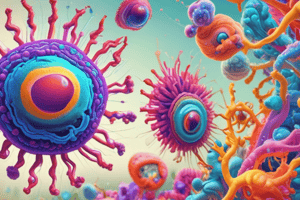Podcast
Questions and Answers
What are the basic building blocks of cells?
What are the basic building blocks of cells?
DNA, proteins, lipids, carbohydrates, and nucleic acids
Give an example of a tissue and its function within the body.
Give an example of a tissue and its function within the body.
Muscle tissue contracts to enable movement.
How do organs differ from tissues?
How do organs differ from tissues?
Organs are visible parts like hearts, lungs, or eyes that perform specialized tasks, while tissues are groups of cells that work together to perform a specific function.
Explain the relationship between organs and organ systems.
Explain the relationship between organs and organ systems.
What role does DNA play in an organism's life?
What role does DNA play in an organism's life?
What does molecular biology focus on?
What does molecular biology focus on?
How do researchers visualize cellular components in molecular biology?
How do researchers visualize cellular components in molecular biology?
What does biochemistry investigate?
What does biochemistry investigate?
Why is understanding evolution crucial in biology?
Why is understanding evolution crucial in biology?
What is the importance of ecology in biology?
What is the importance of ecology in biology?
Flashcards are hidden until you start studying
Study Notes
Exploring Science through Biological Lenses
Biology is one of science's most captivating fields, offering insights into life itself. From single cells to complex ecosystems, biologists study living organisms, their interactions, and the fundamental processes that sustain them. In this overview, we'll delve deeper into some of the key aspects of biological sciences, where curiosity leads us towards understanding our natural world more fully.
Cells, Tissues, Organs, Organ Systems
At its core, biology begins with cells – tiny structures containing molecules essential to life like DNA, proteins, lipids, carbohydrates, and nucleic acids. These basic building blocks combine to form tissues, which perform specific functions within a body. For example, muscle tissue contracts to enable movement while epithelial tissue covers surfaces such as skin. Groups of tissues work together to create organs, visible parts like hearts, lungs, or eyes, each performing specialized tasks. Finally, multiple organs collaborate within systems like digestion or respiration, vital to maintaining holistic health and wellbeing across all species.
Genetics and Evolution
Genetic information stored within DNA dictates how an organism grows, develops, and responds to environmental changes throughout its entire lifetime. Scientists decipher genetic code using techniques such as sequencing and molecular cloning, enabling discoveries about human genetics, evolutionary history, and developmental biology. By observing species over time, scientists can track patterns of change (evolution) through historical records, fossils, and modern comparisons. Understanding the forces behind evolution offers crucial insight into species diversity, adaptation, and extinction.
Ecology & Ecosystems
Ecology explores relationships among organisms and their environments, uncovering intricate webs of dependence between plants, animals, fungi, bacteria, and other entities. A balanced ecosystem sustains many diverse species alongside one another, creating stable communities built upon ongoing cycles of nutrient exchange and energy conversion. Protecting these delicate balances requires knowledge of ecology principles, allowing conservation efforts to safeguard endangered ecosystems worldwide.
Molecular Biology and Biochemistry
Molecular biology focuses on cellular components and mechanisms, from genes to proteins, their synthesis, modification, and degradation. Researchers utilize advanced tools to visualize these minute entities employing fluorescent microscopy and other imaging technologies, revealing previously hidden details about life's inner workings. Biochemistry investigates chemical reactions occurring inside and outside cells, examining energy transfer, metabolism, and enzymatic catalysis. This field contributes immensely to medicine by illuminating pathways leading to diseases and potential therapeutic targets.
In summary, biology offers an extraordinary journey of discovery into the complexity and beauty inherent in life. As you explore these facets, consider joining fellow curious minds in advancing scientific knowledge, contributing your own unique perspectives, and confronting global challenges shaping our collective future.
Studying That Suits You
Use AI to generate personalized quizzes and flashcards to suit your learning preferences.



